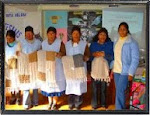
Scott Leonard
Scott Leonard is the CEO of Indigenous Designs, a pioneer in the field of fair trade organic apparel.
1) Where do you see your organization fitting into the capital market spectrum?
I see Indigenous Designs having a two-part mission within the social capital markets. First is to educate people/partners about the entire value chain around organic and fair trade progress and certifications, from the organic farmer to the final consumer.
The second is to serve as a beacon on some of this progress and issues, from our place on the entrepreneurial, wholesale and manufacturing side. SOCAP is an incredible opportunity to convene and build relationships with a lot of our existing funding partners. Further, because SOCAP truly is a place where innovative social financial institutions are coming to work and share ideas, Indigenous Designs is part of a large community working to change the way the world works with money.
2) What do you hope to get out of SOCAP09?
Our conference goal is to bring together social capital players into project-related investments to validate the product chain from field to consumer. My personal goal is to serve the SOCAP conference community as a connective spirit.
3) What questions do you hope to raise at SOCAP09?
In the questions I raise at SOCAP, I hope to bring in the entrepreneurial spirit and perspective. One question I want to raise is about exit strategies. When financial institutions think about asking entrepreneurs about exit strategies, I want them to ponder the question, where do they truly want the entrepreneurs — or themselves — to exit to? Can we take a more mindful and sustainable approach to growth and exit strategies?
The reason I want people to be mindful of exit strategies is because for the last decade, the economy has been built on a house of cards and somewhat slash and burn. Many examples of financial models — even existing ones — are dinosaur and defunct. The past is not the vision of sustainable commerce in which we intend to forge. If the social capital market wants to create an ROI sweet spot, then can we please all be sure not to bring old school matrix and valuations as examples to the table to gauge success? What kind of rate of return do we really need? What do we really want to build?
Overall, I hope to raise questions that surround the importance of voting with our investment money, just as we ask consumers to do with their dollars when they go into a store. I would like for the community to look at the entire model that exists today, and how we can appropriately deconstruct it to create a more sustainable economy. It is possible to deconstruct and retrofit a large bridge while it is still being used? Can we think about the new economy we are building with this as a metaphor?
To me, right now, there are prime examples of this starting to surface and support the building blocks of long term sustainable growth - for example, the whole Slow Food movement, which has set the course for the “Slow Money” movement, which is a close friend of the B.A.L.L.E. and Go Local movements. I think it would be invaluable for us to truly get folks in the investment community to see that the equivalent of a slow-cooked organic meal is the best way to build forward our business intentions.




